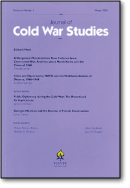Crisis and Opportunity: Nato's Transformation and the Multilateralization of Détente, 1966-1968

Autor(en): Andreas Wenger
Journaltitel: Journal of Cold War Studies
Reviewed:
Band: 6
Ausgabe: 1
Seiten: 22-74
Verlag(e): The MIT Press
Publikationsjahr: 2004